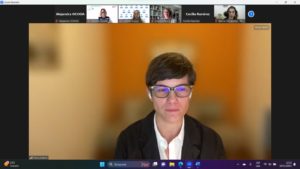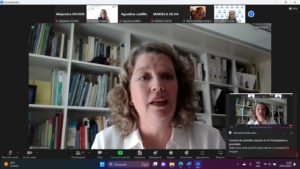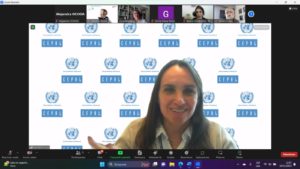The 'What' and 'How' of Change in Secondary Education. A Conversation based on the Book Journey to Secondary School Transformation
The ‘What’ and ‘How’ of Change in Secondary Education. A Conversation based on the Book Journey to Secondary School Transformation.
On November 14, NORRAG held the first activity of the Regional Webinar Series, a space designed to give its members a voice and encourage regional exchange.
The webinar gathered participants from the Spanish-speaking Latin American region, coordinated by Felicitas Acosta. It deployed as a conversation about the book Journey to the Secondary School Transformation—A Roadmap to Implement the changes needed in the Education of Adolescents (UNICEF/Siglo XXI, 2022) edited by Cora Steinberg, education Specialist at UNICEF, Argentina.
Ensuring access to and completion of quality secondary education for all young people remains a challenge in the Latin American region. The content of the reforms and how to implement them are part of the research and educational policy agenda. Based on this, during the first part of the webinar, Cora Steinberg presented the book, which analyses the results of the PlaNEA program- New School for Adolescents, a UNICEF initiative in Argentina. The program seeks to transform secondary education by developing innovations in teaching and learning, guaranteeing well-being conditions for students and teachers. The author introduced the audience to its main components and results, offering qualitative and quantitative data on school improvement.
The conversation continued with the reactions of two other members from the regional network: Daniela Trucco, senior officer of Social Affairs at the Economic Commission for Latin America and the Caribbean (ECLAC, Santiago de Chile) and María Balarín, senior researcher at the Group of Analysis for Development (GRADE, Peru). From their institutions and considering the reality of their countries, they pointed out key elements of secondary education reforms regarding the inclusion agenda. They highlighted the progress and challenges of this kind of program, focusing on the different rhythms of transformation. Network members participating in the webinar joined the conversation, illuminating other topics, such as educational reform sustainability over time.
Finally, the regional coordinator reflected on the dynamics of change in the educational sector from a regional perspective, considering the tensions emerging from the conversation: between the national and subnational scale, between the pace of the actors and the pace of the system, between the perspectives of researchers, decision-makers and institutional agents.
More to come soon about NORRAG’s new exciting initiative!



Serie de Webinars Regionales
El “qué” el “cómo” del cambio en la educación secundaria. Una conversación a partir del libro Viaje a la transformación de la escuela secundaria
El 14 de noviembre, NORRAG realizó la primera actividad de la Serie de Webinars Regionales, un espacio diseñado para dar voz a sus miembros y fomentar el intercambio regional.
El webinar reunió a los miembros de la región latinoamericana de habla hispana, coordinada por Felicitas Acosta. Se desarrolló en torno a una conversación sobre el libro Viaje a la transformación de la escuela secundaria – Una hoja de ruta para implementar los cambios necesarios en la educación de los y las adolescentes (UNICEF/Siglo XXI, 2022) editado por Cora Steinberg, Especialista en educación de UNICEF, Argentina.
Garantizar el acceso y la finalización de una educación secundaria de calidad para todos los jóvenes continúa siendo un desafío en la región latinoamericana. El contenido de las reformas y la forma de implementarlas forman parte de la agenda de la investigación y la política educativa. En función de esto, durante la primera parte del webinar, Cora Steinberg presentó el libro, en el que se analizan los resultados del programa PlaNEA Nueva Escuela para Adolescentes, una iniciativa de UNICEF en Argentina. El programa busca transformar la educación secundaria desarrollando innovaciones en la enseñanza y el aprendizaje, garantizando condiciones de bienestar para alumnos y docentes. La autora presentó a la audiencia sus principales componentes y resultados, ofreciendo datos cualitativos y cuantitativos sobre las mejoras en las escuelas.
La conversación continuó con las reacciones de otros dos miembros de la red regional: Daniela Trucco, oficial senior de Asuntos Sociales de la Comisión Económica para América Latina y el Caribe (CEPAL, Santiago de Chile) y María Balarín, investigadora senior del Grupo de Análisis para el Desarrollo (GRADE, Perú). Desde sus instituciones y considerando la realidad de sus países, señalaron elementos clave de las reformas de la educación secundaria en relación con la agenda de inclusión. Destacaron los avances y desafíos de este tipo de programas, centrándose en los diferentes ritmos de las transformaciones. Los miembros de la red que participaron en el webinar se unieron a la conversación, iluminando otros temas, como la sostenibilidad de las reformas educativas a lo largo del tiempo.
Por último, la coordinadora regional reflexionó sobre la dinámica del cambio en el sector educativo desde una perspectiva regional, considerando las tensiones que surgieron de la conversación: entre la escala nacional y la subnacional, entre el ritmo de los actores y el ritmo del sistema, entre las perspectivas de los investigadores, los responsables de la toma de decisiones y los agentes institucionales.
Pronto tendremos más novedades sobre esta nueva e interesante iniciativa de NORRAG!

